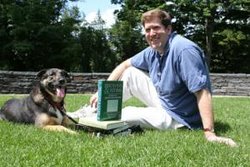Next gift suggestion: Chad Orzel’s EUREKA!

Another book that I jumped right up and ordered as soon as I knew it existed: Eureka! Discovering Your Inner Scientist, by physicist Chad Orzel.
Chad has been making a name for himself lately as a science communicator, as well as being an actual working scientist. And this, by me, is good. As much as I love science, it’s through the science journalists that I find out what is going on.
His previous books were How to Teach Physics to Your Dog, and How to Teach Relativity to Your Dog. In them he revives the grand tradition (going all the way back to the Greek philosophers) of presenting ideas by means of a conversation between two parties. In this case it’s especially useful, as Emmy is a very practical, focused and pragmatic dog.  It’s a good idea to stay grounded, when you’re discussing something like quantum physics…

I haven’t yet received my copy of Eureka. I pre-ordered it so that it will pop up on my Kindle on December 9th, the instant it’s released (I’m writing this post on December 8th).
But I couldn’t wait, so I went exploring through the book on Amazon, using the “Look Inside” feature. I was able to look at a lot, possibly because I was on record as having bought the book. And I found much to love.
The moment that made me sit up straight and say “YES!” was when he first expresses the scientific process as taking place in four stages: looking, thinking, testing, and telling.
Does this sound familiar? It should. It’s what the Steerswomen do.
Chad works out those four stages in the rest of the book — and his point in Eureka! is that the scientific process is not some mysterious activity engaged in only by hyper-intelligent (and socially clumsy) braniacs.   In fact, we use scientific thinking every day, and have done so ever since we were us.
“For as long as there have been humans, then, there have been humans doing science. The process of looking at the world, figuring out how things work, testing that knowledge, and sharing it with others ought to be taken as one of the defining traits of our species. The process of science is not some incidental offshoot of more general human activity; it’s the very thing that makes us who we are.”
Eureka! Discovering Your Inner Scientist, on Amazon
Here’s a video of Chad Orzel explaining what playing bridge has to do with the discovery of dark matter.
And here’s a video of Chad explaining what stamp collecting has to do with Darwin and the theory of evolution through natural selection.
And here’s Uncertain Principles, Chad Orzel’s blog.
And, oh, look: Yet another little article of mine from the misty depths of antiquity, coincidentally discussing a closely-related topic.
(As Cecil said on the very first episode of Welcome to Night Vale: “We have all been scientists at one point or another in our lives.”)